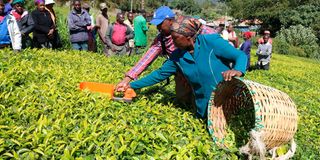Tea plucking kits to save labour costs

A farmer is shown how to use the hand-operated tea plucking machine in Githunguri, Kiambu County.
Tea is among the top cash crops earning Kenya a significant amount of foreign exchange. Usually grown on plantations, the crop has made Kenya one of its main exporters globally.
And as the world transitions to the digital technology space, so is the local and foreign tea industry.
Modern technology in agriculture contributes to increased harvests, brings with it efficiency and makes work easy.
Last week, farmers in Githunguri, Kiambu County, were treated to a rare visit by Kenya Tea Development Agency (KTDA) officials and the technical team.
The KTDA group trained farmers on the use of an advanced plucking machine.
Githunguri Tea Zone experiences an acute shortage of workers. Many young men are into alcohol and the ones available rarely venture into plucking tea. Workers have to be sourced from distant regions.
The hand-operated gadget can harvest up to 150 kilos of leaves a day, greatly reducing labour costs.
According to a Kambaa Tea Factory official who did not want to be named, a farm only requires two employees if it has the machine – the operator and the one sorting the harvested leaves.
“The machine, which goes for bSh30,000, is powered by a 24 voltage rechargeable battery,” the factory official said during the induction in Gathangari.
“The battery can work for eight to 10 hours.”
The hundreds of farmers who attended the training were curious to learn about the kit.
Many said they have been struggling to produce enough green leaves due to the high cost of labour and inputs.
Catherine Wanjiku, one of the Githunguri Tea Zone farmers, expressed hope that the kit would be a reprieve to many. She added that labour costs have been rising almost daily.
“A worker is paid Sh10 for every kilogramme of leaves harvested yet the buying price is Sh21. We lose a lot at times due to shortage of manpower,” Wanjiku told the Seeds of Gold team
The losses, she added, are occasioned by low and poor-quality harvests. This happens when leaves overgrow as a result of not being plucked on time.
Wanjiku, who owns a five-acre piece, has been growing tea for four decades.
Tea growers across the country predominantly rely on plucking by workers.
Kimani Kinyanjui, another farmer, praised the technology.
“The technology can be improved with time as we get used to the machines. It will address wastage,” Kinyanjui, who has four acres under tea, said.
He complained that many young people in Githunguri are no longer engaged in the production of tea.
According to Heifer International, an international non-profit making organisation, modern technology and innovations will attract young people to farming and help improve their contribution to the food production value chain.
The KTDA officials, however, told farmers to take precautions when using the machine, including wearing gloves, earmuffs, goggles, gumboots and helmets.
The machine should not be operated in the rain.
Workers and their unions in some tea zones have resisted mechanisation and technology, fearing job losses.
Tea farmers across the country have been complaining about poor prices as production expenses rise.
Deputy President Rigathi Gachagua is spearheading reforms in the tea, coffee and dairy industries.





